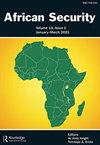Peacekeeping as Coup Avoidance: Lessons from Ghana
IF 1.3
Q2 POLITICAL SCIENCE
引用次数: 5
Abstract
ABSTRACT Recent scholarship has claimed that peacekeepers are more likely to mutiny or attempt military coups against their governments after returning home. These trends stand in contrast to the case of Ghana, which witnessed a perhaps unprecedented transition out of the “coup trap” to stable democratic rule, including multiple transfers of power to the political opposition while providing substantial and ongoing peacekeeping manpower. This is especially interesting given Ghana’s infamous mutiny in the Congo and the coup against Kwame Nkrumah, had their roots in peacekeeping. Potentially seen as a deviant case through the lens of recent scholarship, as evaluation of Ghana’s experience illustrate that different leaders under various regime types deliberately utilized peacekeeping deployments as a coup avoidance strategy. This experience has also acted as a tool to gain military resources from foreign donors, while the government has deliberately made efforts to avoid mission hardships and perceptions of victimization seen in other contingents.维和作为避免政变:来自加纳的教训
最近的学术研究表明,维和人员回国后更有可能发动兵变或试图对政府发动军事政变。这些趋势与加纳的情况形成鲜明对比,加纳见证了从“政变陷阱”到稳定民主统治的前所未有的过渡,包括多次向政治反对派移交权力,同时提供了大量和持续的维和人力。考虑到加纳在刚果发生的臭名昭著的兵变和针对夸梅·恩克鲁玛的政变都源于维和行动,这一点尤其有趣。从最近学术研究的角度来看,这可能被视为一个离经叛道的案例,因为对加纳经验的评估表明,不同政权类型下的不同领导人故意利用维和部署作为避免政变的策略。这一经验也成为从外国捐助者获得军事资源的工具,而政府则刻意努力避免在其他特遣队中出现的任务困难和受害的感觉。
本文章由计算机程序翻译,如有差异,请以英文原文为准。
求助全文
约1分钟内获得全文
求助全文

 求助内容:
求助内容: 应助结果提醒方式:
应助结果提醒方式:


